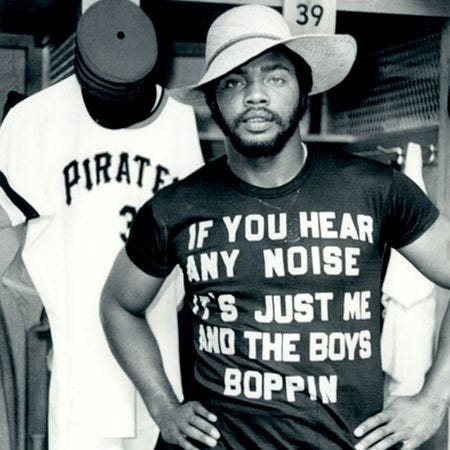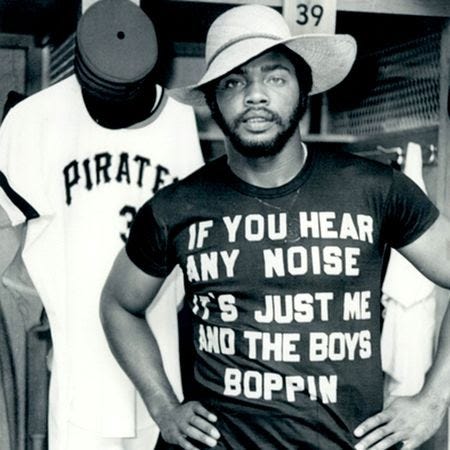Dave Parker, Willie Stargell, Sister Sledge, and the Coolest Team in Baseball History (1979)
In Pittsburgh, in 1979, the Boys Were Boppin'.
This is Throwbacks, a newsletter by me, Michael Weinreb, about sports, history, culture and politics, and everything in-between.
If you like what you read, please click the button below, join the mailing list for FREE and please share, on social media or through e-mail or however you feel comfortable sharing.
And if you’ve been reading for a while, please consider a paid subscription to unlock certain posts and help keep this thing going—you’ll also get full access to the historical archive of over 250 articles. (Click here and you’ll get 20 percent off either a monthly or annual subscription for the first year.)
(If your subscription is up for renewal, just shoot me an email and I’ll figure out a way to get you that discount, as well. If you cannot afford a paid subscription and would like one, send me an email and I’ll comp you one, no questions asked.)
I.
On the first day of June in 1979, it rained for roughly half an hour in Pittsburgh, which was just enough time for one Major League Baseball team to ascend to new levels of disco-era cool. How it happened was quite simple: As rain flooded the neon-green artificial turf at Three Rivers Stadium, the stadium speakers played the hit pop songs of the moment. The number four song on the Billboard chart that week—behind Donna Summer’s “Hot Stuff,” Peaches and Herb’s “Reunited” and the Bee Gees’ “Love You Inside Out”—was “We Are Family,” by a modestly successful sister act called Sister Sledge. The song caught the ear of an affable 38-year-old Pirate slugger named Willie Stargell, who picked up a dugout phone that went straight to the press box and told the team’s PR director, “I want you to make an announcement that this is the official Pirates clubhouse song.”
“We Are Family” was not exactly larded with lyrical complexities, but it sure was catchy as hell. It also spread an inclusive message that caught on with Stargell, who had been in Pittsburgh back in 1971, when the Pirates fielded the first All-Black and Latino roster in baseball history. And so, much to Stargell’s amusement, the announcement went up on the scoreboard seconds after he made the request: We Are Family, The Official Theme Song of the 1979 Pirates. Later that day, the Pirates—buoyed by a three-run home run from outfielder Dave Parker—came back to defeat the San Diego Padres, 9-8.
Parker would later say he preferred a more brash theme song like McFadden and Whitehead’s “Ain’t No Stoppin’ Us Now. “ This is not surprising, given that Parker—who died last week at age 74—was one of the most outlandish players in modern baseball history. But Stargell—who also, according to Parker, had a thing for the Doobie Brothers—was the moderating influence, and what occurred over the course of that summer proved to be arguably the most powerful connection between a sports franchise and a pop song in modern history.
I’d argue that there has never been a more aesthetically and culturally diverse team than the 1979 Pirates—the wedding-cake hats, the ballpark-mustard uniforms, the rent-a-cop ethos of sidewinding reliever Kent Tekulve, the groovy psychedelic energy of pitcher Dock Ellis, the walrus mustache of Phil Garner, the brash baserunning of center fielder Omar Moreno, and most of all, the roster effortlessly balanced between Black and Latino and white. And yet somehow, it all came together in a World Series win, which is why “We Are Family” stuck so completely over that summer and beyond. There was an obvious analogy to all those disparate personalities coming to co-exist so successfully in the same clubhouse. And while Stargell was the patriarch of this eclectic family, Dave Parker was the engine.
II.
In 1978, after Dave Parker broke his jaw during a collision at home plate, he briefly wore this hockey mask to protect his face, which led to this unbelievable photograph:
Even if this moment predated the Friday the 13th movies, it is quite a flex from a flamboyant Black man in a city that wasn’t always welcoming of his presence. But Parker didn’t let much of anything bother him. He led the National League in hitting in 1977 and 1978, and won the National League MVP award in ‘78. He also wore a custom-made T-shirt that quoted lyrics from Parliament Funkadelic’s “Mothership Connection,” which resulted in one of the most sensational photos in baseball history, and which I happen to think is worth including twice in this newsletter.1
Parker was arguably the best player in baseball for those few years, and he was unafraid to proclaim himself as such. “There’s only one thing bigger than me,” Parker, who stood 6-foot-5 and weighed 230 pounds, told
of Sports Illustrated, “and that’s my ego.”In the offseason between 1978 and 1979, Parker signed a massive contract with the Pirates that paid him nearly a million dollars a year. All the while, he was entirely self-aware of the symbolism of being an unapologetically rich Black man in a city like Pittsburgh, as he noted to legendary Los Angeles Times columnist Jim Murray:
Over the coming months, someone would slash the rooftop of Parker’s convertible Mercedes. Someone threw rocks through his window, someone vandalized his estate, fans hurled objects at him in right field, and many others sent him vile hate mail, including a poem that Parker later hung in his locker that began this way:
III.
I was far too young to comprehend the cultural impact of that Pirates team in the moment, but growing up in central Pennsylvania, I have a fuzzy recall of the way their sheer charisma carried halfway across the state. While the Steelers reflected the city’s working-class ethos, the diversity and joyfulness of those Pirates briefly made Pittsburgh feel like the hippest city in America. When the Pirates stumbled early in that 1979 season, it didn’t matter because they found their footing and made it to the World Series; when they fell behind 3 games to 1 to the Baltimore Orioles, it didn’t matter because they won three straight and brought home a title to Pittsburgh. Nothing seemed to bother them at all.
Over time, the marriage of Sister Sledge and the ‘79 Pirates came to embody the defiant hopefulness of the disco era amid an otherwise depressing era in America. And it came at a moment when white America was still coming to terms with the boldness and brashness of athletes like Dave Parker, who would get the call that he’d made the Baseball Hall of Fame just months before his death due to complications from Parkinson’s disease.
“We Are Family” is an undeniably cheesy song. But it was also broadly aspirational, and I suppose that’s why it stuck that summer—because a country suffering through recessions and energy shortages and deindustrialization needed an upbeat reminder that we were still in this together, and that a vision of a better America was still possible. That Pirates team felt as if it somehow defied the cynicism and racism that threatened to pull it apart from outside. Their two most prominent players, Dave Parker and Willie Stargell, were very different men with very different temperaments, but I suppose it proves the overarching point of the “We Are Family” Pirates that their legacies will be forever intertwined. “Our society is full of hatred, but he taught us about love,” teammate Al Oliver said of Stargell after his death. “He proved that people of different races and backgrounds can come together for one common purpose.”
This newsletter is very much a work in progress. Thoughts? Ideas for future editions? Contact me via twitter or at michaeliweinreb at gmail, or leave a comment below. If you enjoyed this newsletter, please subscribe and/or share it with others.
If you’re still not convinced that Parker was one of the coolest baseball players who ever lived, check out this playlist he curated back in 2019.









I also remember those days growing up in Central Pennsylvania. Probably highway robbery Stargell had to share MVP that year with Keith Hernandez. Pirates had some great teams in the 70’s
I still remember during that World Series, the wives of the players, all dressed in their fur coats, dancing to that song on top of the dugout . Every time I hear We Are Family, I still picture that scene